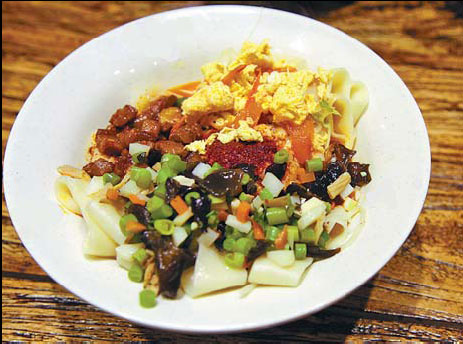Biangbiang Shaanxi street food
|
Shaanxi biangbiang noodles (above) and pork sandwich (below). Photos by Fan Zhen / China Daily |

As the weather turns brisk and you smell snow in the air, there is nothing like a vast bowl of hot, soupy noodles to warm you up and keep you going through Beijing's winter.
Qin Chuan Chuan, a Shaanxi noodle shop located around the corner from the University of International Business and Economics, has been warming tummies across the neighborhood.
For a novice gourmet exploring Chinese cuisine, Shaanxi street food is a good entry point. Some of its snacks have a history that can be traced back to the Han Dynasty (206 BC-AD 220).
These dishes have now found favor not only with patrons of street food carts but on banquet tables and the menus of famous restaurants.
The cooking skill sets are no different from those of ordinary Chinese cooks, but the food genre's variety is what makes it such a great diving-off point for first-timers.
Shaanxi, in Northwest China, has a cold climate with frequent sandstorms, so food there tends to be spicy, greasy and meaty to keep the people warm.
Our neighborhood Shaanxi eatery Qin Chuan Chuan is not your average hole-in-the wall Chinese noodle shop. It is neat and clean, and artfully decorated with rustic wooden tables and benches bathed in plenty of light.
Biangbiang noodles are a must-try. This traditional dish is considered one of the 10 strange wonders in Shaanxi province, and all you need to do is to take a look at its name in Chinese characters to see why.
Most Chinese would not even know how to write the 57-stroke character for "biang" which has so many turns that it actually looks like a hieroglyphic on paper.
The character was created by the local people a long time ago. It has been passed down through word of mouth folklore. So the word is not found in any modern Chinese dictionary, let alone on the keyboards of a computer.
"Biang" is the onomatopoeic name the noodles are given, referring to the sound the chef makes when he pulls the dough into noodles and bangs them against the table.
Biangbiang noodles are thick, fat and long. Each belt-like strand is three-finger wide, spiraling down into a big bowl.
It is served dry, with toppings of chili and pork belly - wu hua rou or five-flowered meat that has alternating layers of fat and lean meat. The noodles are chewy, light, sour and spicy, and delicious slivers of meat tremble on top of our noodle mountain, waiting for eager chopsticks to start the journey from bowl to mouth.
The Shaanxi version of the ubiquitous Western hamburger is fatty pork sandwich (lazhi rou jiamo) that is very tasty and surprisingly light. The pita-like bread they use to encase the succulent fatty pork is the perfect receptacle for the soft, slightly greasy meat.
We also ordered the hand-pulled noodles with sour soup which comes with a generous portion of thick, hand-pulled noodles - never-ending strands out of a hot-and-sour broth filled with garlic and scallions. Order it with extra vegetables and slurp away. The broth warms and the noodles nourish.
For those who want some meat in their bowls, the qishan noodles with ground pork are a house favorite. On the day we went, we counted five other tables with the same order.
The broth is tangy, but hit the back of our palate with its salty-spicy aftertaste. Peppered with vegetables, meat and egg, this is a hearty, flavorful choice.
There is no English on the menu, but there are plenty of photographs, and you can always look at the next table for an instant reference.
(China Daily 11/17/2012 page12)























